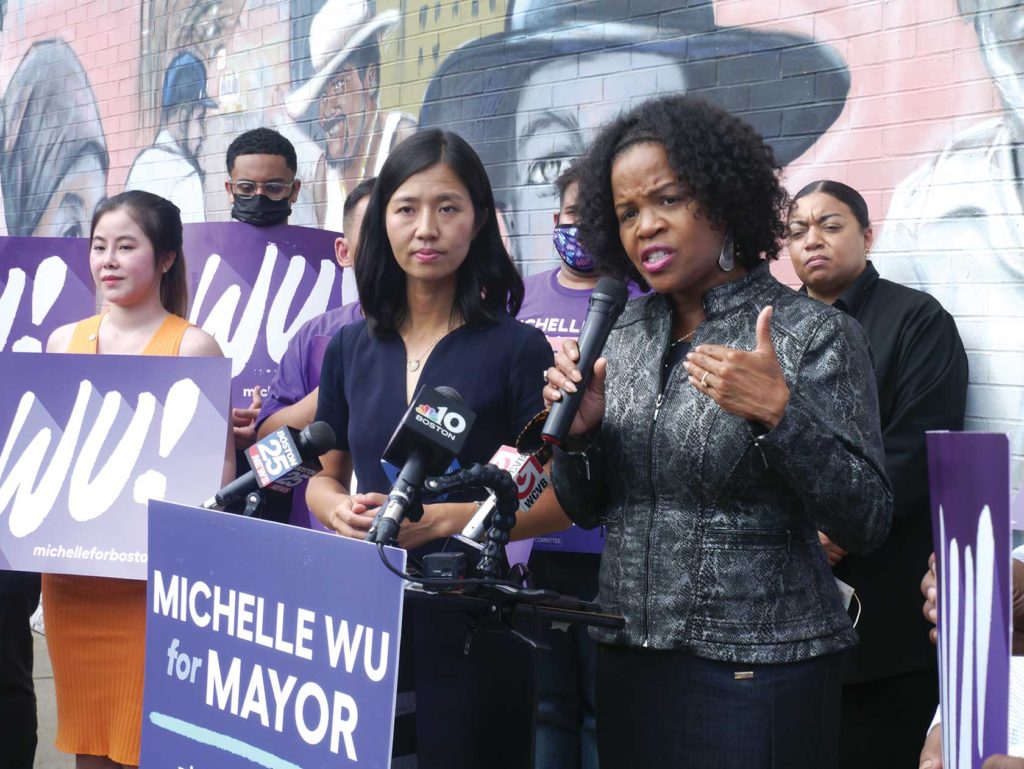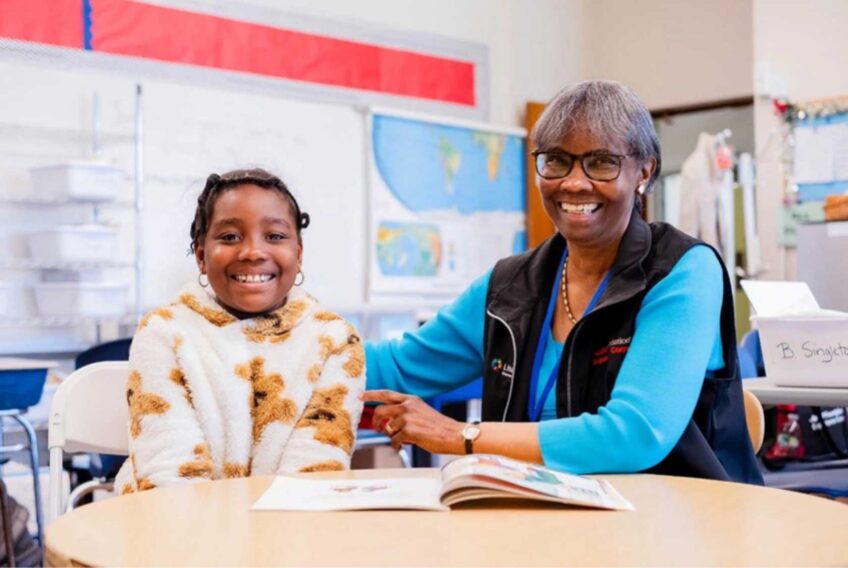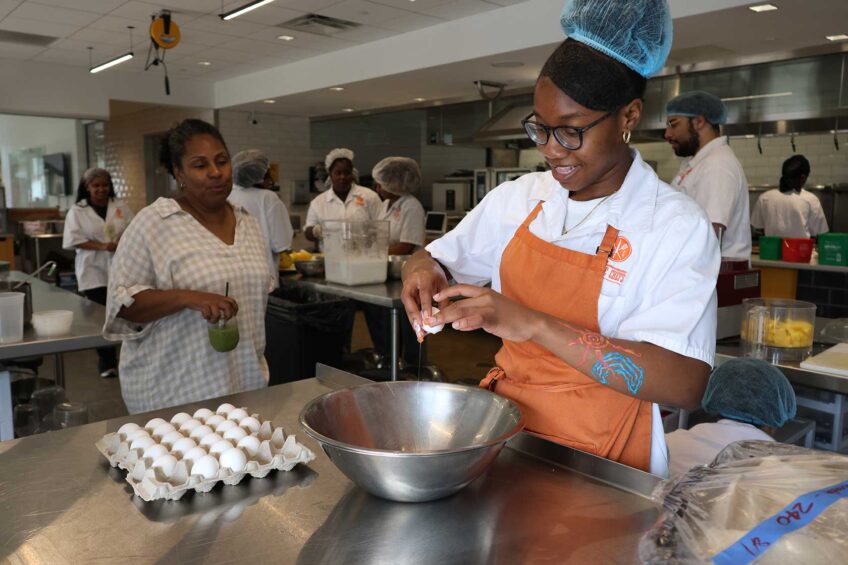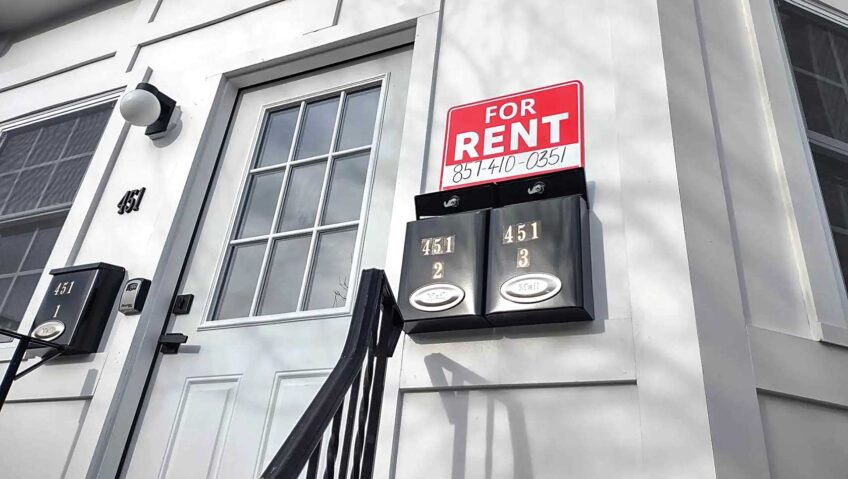Janey backs Wu, Essaibi George reaches out to Black voters
Mayoral candidates compete for Black, Latino votes

Following the preliminary election, unions and elected officials have begun declaring their support for one of the two finalists set to face off in November. However, their impact remains unclear as campaigns set their sights on undecided Black voters.
Since securing the top spot, City Councilor Michelle Wu, who is running on a progressive platform and who finished with 33.4% of the vote in the preliminary, has been endorsed by acting Mayor Kim Janey, City Councilor Ricardo Arroyo, Suffolk County Register of Probate Felix D. Arroyo, gubernatorial candidate and state Sen. Sonia Chang-Diaz, state Rep. Liz Miranda and SEIU 1199, which represents health care workers.

Mayoral candidate Annissa Essaibi George speaks to Roxbury residents on Warren Street during a peace walk held by clergy
from the 12th Baptist Church. BANNER PHOTO
City Councilor Annissa Essaibi George, the second-place finisher with 22.5% of the vote, has since received endorsements from the local sprinkler fitters union and IBEW Local 103, which represents electrical workers.
Janey’s endorsement of Wu has been categorized as “unprecedented,” as she has been the first Black female mayor in the city’s history. At the press conference during which she expressed her support for Wu, Janey acknowledged the significance of her tenure, as well as the interests of her constituents.
“It took 200 years to get the first woman mayor, to get the first Black mayor. Many folks here have been part of that advocacy, part of that organizing for years,” Janey said. “And so there is disappointment, we can’t ignore that. We have though, an opportunity. We cannot squander the next opportunity to make sure the voices of Black and brown people are at the center of the discussion, at the center of the policies that will move our city forward.”
In her statement, Janey captured what many are viewing as the crux of the next few weeks — that undecided voters will be looking to align themselves with the candidate with concrete plans to fix the city’s issues, especially ones that have disproportionately affected majority Black and brown neighborhoods.
“For an endorsement for a candidate to get people excited about [voting], you’ve got to see something that’s going to actually relate to a practical issue that people can identify with and therefore be enthused about coming out to vote,” said veteran Democratic activist Louis Elisa.
He gave examples of the situation around the addiction treatment centers at Mass and Cass, affordable housing and infrastructure plans. Elisa also added that “putting people on the street and getting literature out” may give a leg up come November.
Taking this strategy to heart, Essaibi George has been pounding the pavement in Boston’s neighborhoods, talking with Boston residents.
Friday evening, Essaibi George participated in a peace walk with clergy from the 12th Baptist Church and Boston Police Area B-2 commander Captain Dennis Cogavin, visiting businesses and chatting with residents in the Nubian Square area.
In the El Mondonguito restaurant on Dudley Street, a man who gave the name Giovanni leaned in as Essaibi George walked toward the counter.
“What are you going to do for Boston?” he asked.
“A little bit of everything,” Essaibi George said. “Schools, housing, economic development. What do you want me to do?”
“Fix the housing situation,” Giovanni said.
Wu and Essaibi George have presented differing visions for the mayor’s office. Essaibi George has dismissed Wu’s campaign promises to push for free MBTA rides and a return to rent control in Boston, noting that those issues fall under the purview of the Legislature. Essaibi George has taken a more moderate stand on issues such as policing, calling for the addition of more officers on the force.
Another major player in the mayoral preliminary — and a voice that may carry weight among Black voters — is Councilor Andrea Campbell, who has not yet endorsed either candidate. In a statement, she said, “My challenge to Essaibi George and Wu is to tell our communities — not merely in private meetings or phone calls with me or stakeholders, but publicly and directly to residents — what specific, tangible plans they have to deliver racial equity in our health, housing, schools, public safety and economic systems.”
Yawu Miller contributed to this article.






